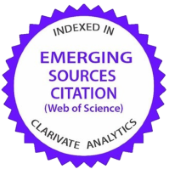Do Travel and Tourism Competitiveness determine International Tourism Inbound Receipts? A Quantile Regression Model for 125 Countries
DOI:
https://doi.org/10.29036/jots.v14i26.482Keywords:
competitiveness, tourism, GDP, quantile regression, model, receiptsAbstract
Tourism is one of the sectors of the economy most affected by the situation caused by the spread of COVID-19. For the re-growth of international tourism competitiveness, it is important to know the main determinants affecting tourism performance, specifically international tourism inbound receipts (ITIR). This paper aims to find out whether a country's ITIR is determined by travel and tourism gross domestic product (GDP) and travel and tourism competitiveness measured by the Travel and Tourism Competitiveness Index (TTCI). The data was obtained from the Travel and Tourism Competitiveness Report from 2019. The proposed new model for 125 countries is specific because we consider conditional quantiles of the dependent variable. The results of a quantile regression determined that individual percentiles of the ITIR are more affected by travel and tourism GDP and TTCI than other percentiles of the ITIR, which was then reflected in the changes of regression coefficients. Considering the findings of this paper, it is possible to implement competitive destination policy not only for the specific geographical cluster, as in the existing literature, but also for groups of countries created according to the affiliation to selected quantiles. This study significantly contributes to the theory and empirical evidence of the influence of tourism competitiveness when modeling tourism performance. Moreover, even though existing studies encourage quantile regression usage in tourism research, this paper appears to be original in determining the variables entering the analysis (ITIR, TTCI, travel, and tourism GDP).
Downloads
Downloads
Published
Issue
Section
License
Copyright (c) 2023 Journal of Tourism and Services

This work is licensed under a Creative Commons Attribution-NonCommercial-NoDerivatives 4.0 International License.
Journal of Tourism and Services (ISSN 1804-5650) is published by the Center for International Scientific Research of VŠO and VŠPP in cooperation with the following partners:
- Juraj Dobrila University of Pula, Faculty of Economics and Tourism, Croatia
- School of Business and Administration of the Polytechnic Institute of Setúbal, Portugal
- Szent István University, Faculty of Economics and Social Sciences, Hungary
- Pan-European University, Faculty of Business, Prague, Czech Republic
- Pan-European University, Faculty of Entrepreneurship and Law, Prague, Czech Republic
- University of Debrecen Faculty of Economics and Business, Hungary
- University of Zilina, Faculty of Operation and Economics of Transport and Communications, Slovakia
The publisher provides a free access policy to the Journal of Tourism and Services.





